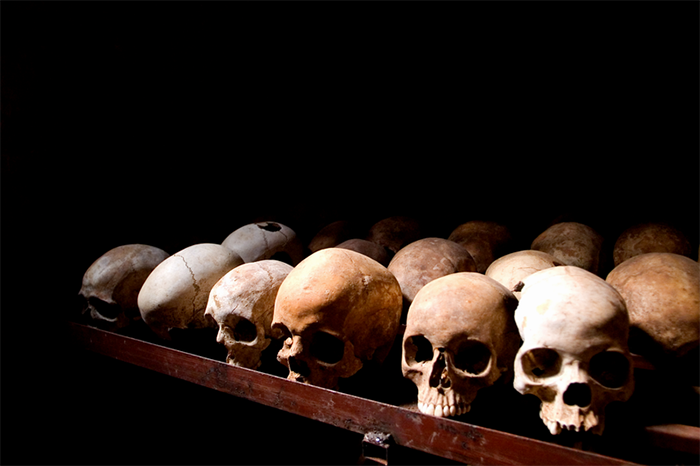──あなたはフツの人々への怒りを率直に述べています。あなたはどのようにして赦(ゆる)すことができるようになったのでしょうか。また、和解への長い道のりで最も支えてくれた霊的な行いは何でしょうか。
[toggle]You share candidly about your anger at the Hutu people. How have you learned to forgive, and what spiritual practices have most sustained you in this long pursuit of reconciliation? [/toggle]赦しとは、起こった出来事を忘れることではありません。私は(何が起こったかを)覚えていますが、それ以上の憤りはありません。私たちには人間として、怒りや復讐心を克服するための力、神様からの新たな力が必要です。
[toggle]Forgiveness doesn’t mean that I forget what happened. I remember, but I have no more resentment. As human beings, we need new strength from God to overcome feelings of resentment and revenge. [/toggle]ある日、仕事を終えた私はベッドのそばでひざまずき、神様と話していました。「なぜ殺害をやめさせず、介入してくださらなかったのですか」と訴えたのです。怒りに駆られて、私は神様にすべてを話しました。私が抱いた恐れや絶望、怒りについて。そのとき、ある重要なことを神さまは明らかにしてくださいました。「デニス、あなたは恵みによって生き延びたのだ。人々にその恵みを分け与えなさい! 信徒を裏切ったあなたの牧師やあなたを見捨てた人、あなたの愛する者を殺した殺人者を赦しなさい。もし彼らが心を頑(かたく)なにして悔い改めないのであれば、その者には私が臨む。あなたの仕事は、彼らが再び人になれるよう助けることだ」
[toggle]After my work, I would kneel beside my bed and talk with God. I reproached him for not intervening to stop the killing. In my anger, I told him everything: my fear, hopelessness, and anger. During that time, he revealed something important: “Denise, you survived by grace. Give that grace to others! Forgive your pastor who betrayed his flock, the congregation that abandoned you, the killers who murdered your loved ones. If they harden their hearts and refuse to repent, that is my business. Your task is to help them become human again.” [/toggle]私は言いました。「赦すなんてできません! 彼らはもう人間ではありません。彼らは獣(けもの)にも劣る者たちです」。教会が謝罪のステップを踏むことなしにサバイバーたちに赦しを求める姿勢が私は好きではありませんでした。しかし、神は御言葉を通して、「殺人者でさえ、自らの罪を告白して悔い改めることができる」と思い起こさせてくれました。
[toggle]I said, “No, I can’t forgive them! They are not human beings anymore. They are worse than animals.” I did not like the way churches demanded survivors to forgive, while they took no steps to apologize. But God reminded me, through his Word, that even killers could confess their sins and repent. [/toggle]フツ難民の第一陣がコンゴからルワンダに戻ってきましたが、彼らは何も持っていませんでした。私はほかの人たちと一緒に、食べ物や着るものを彼らに渡しました。フツの若い女性が私の家にやって来て、何か食べるものを求めたとき、私は急いで寝室に入り、ベッドにひざまずいて祈りました。「ここにやって来るなんて、どういうつもりなのだろう。彼女は自分たちがしたことを忘れたのかしら」。すると、「悪に負けることなく、善をもって悪に勝ちなさい」(ローマ12:21)という聖句が思い浮かびました。私は神様に耳を傾け、その教えに従いました。私はまた自分の怒りと憎しみについて赦しを乞(こ)いました。
[toggle]When the first Hutu refugees returned to Rwanda from the Congo, they had nothing. I organized, with others, to give them food and clothes. A young Hutu woman came to my home, begging for something to eat. I was amazed. I hurried into my bedroom and knelt by my bed to pray: “Is it possible that this woman dares come here? Has she forgotten what they have done against us?” Then I remembered Romans 12:21: “Do not be overcome by evil, but overcome evil with good.” I listened to God and obeyed what he taught me. I also asked forgiveness for my own anger and hate. [/toggle]
ザイールの難民キャンプ(写真:CDC)
──あなたは虐殺後の共同体の重要性を説いています。あなたが一人ではないと気づいたことは、どんな変化をもたらしましたか。
[toggle]You describe the importance of community in the aftermath of the genocide. What difference has it made to realize you are not alone? [/toggle]愛する人を失った人はみな、信頼できる相手を探しています。互いの重荷を負うことが、孤立から癒やしへの第一歩であることを私たちは知りました。私がほかの未亡人と出会い始めたとき、料理に使う火のことを思い起こしました。木の枝が散らばっていると、火種はくすぶったまま消えてしまいます。しかし、枝をかき集めたら、火種は炎になって燃え上がるのです。
[toggle]Everyone who had lost loved ones longed for someone to trust. We discovered that bearing one another’s burdens is the first step from isolation to healing. When I started meeting with other widows, I was reminded of a cooking fire: When smoldering sticks are scattered, they smoke and go out. But if they’re brought together, they flare into flame. [/toggle]私が敬愛する92歳の義母はこのように言っていました。「一人でいると、自分のことしか考えられない。でも、誰かを助けるとき、私もまた助けられる」。彼女は自分の村でアルコール依存症のサバイバーを助け、「人を殺(あや)めた人たちも、再び人間になってほしい。この場所で彼らもまた愛することを学ぶでしょう」と言って、自分の土地をコミュニティ-・センターに寄付しました。
[toggle]My dear 92-year-old mother-in-law made the same discovery, saying, “When I’m alone, I think only of myself. But when I help someone else, I too am helped.” She is the one who got survivors in her village to stop depending on alcohol and then donated her land for a community center, saying, “I want those who killed, also, to become human again. In this place, they too will learn to love.” [/toggle]イエス様が私たちの団結の中心にあったことを強調しなければなりません。イエス様なしで集まっても、良い方向に進むことはできなかったでしょう。世の中には間違った考えを中心に集まり、互いに憎しみを駆り立てる人が大勢います。私たちはまだ神様に多くの疑問を抱いていましたが、私たちが慰めを見いだしたのは、イエス様の前でお互いに耳を傾け、イエス様のほうを向くことでした。
[toggle]I must underscore that Jesus was at the heart of our togetherness. To get together without him would not have helped. Many people in this world get together in a wrong spirit, inciting each other to hatred. It was through turning to Jesus, listening to each other in his presence, that we started to find comfort—even though we still had many questions for God. [/toggle]
ニャマタ虐殺記念教会に並べられた犠牲者の頭蓋骨(写真:Fanny Schertzer)
──この100日の虐殺の間、イエス様に従う者たちに何をしてほしいと思いますか。そして、世界中のクリスチャンはいま「ルワンダ虐殺」について何を理解すべきでしょうか。
[toggle]What do you wish followers of Jesus had done during those 100 days of slaughter? And what should Christians around the world understand about the Rwandan genocide today? [/toggle]被害者を守り、大量虐殺を阻止するため、国連が介入するように、世界中のクリスチャンは圧力をかけるべきでした。ルワンダのクリスチャンは、分裂やヘイト、差別をもたらす政府の政策に反対すべきでした。残念なことですが、ルワンダのクリスチャンの間では、虐殺の前から憎しみと分裂が広がっていたのです。
[toggle]Christians all over the world should have put pressure on the United Nations to intervene, to protect the victims and stop the genocide. Christians in Rwanda should have opposed government policies of division, hate, and discrimination. Unfortunately, hate and division had spread among Christians in Rwanda even before the genocide. [/toggle]今日、私たちは、虐殺が突然起こったものではないことを理解する必要があります。ツチを人でない存在として扱うプロパガンダと差別によって、長い間に準備されてきたことでした。ユダヤ人や難民のような、いかなるマイノリティーへの差別にも、私たちは注意を払わなければなりません。そして、「みなしごや、やもめが困っているときに世話をし、世の汚れに染まらないように自分を守る」(ヤコブ1:27)という神様の命令に従うべきです。
[toggle]Today, we need to understand that the genocide did not come overnight; it was long prepared by dehumanizing propaganda and discrimination against one population group, the Tutsi. We must be attentive to discrimination against any minority, like Jews or refugees. And we should obey God’s command in James 1:27, “to look after orphans and widows in their distress and to keep oneself from being polluted by the world.” [/toggle]本記事は「クリスチャニティー・トゥデイ」(米国)より翻訳、転載しました。翻訳にあたって、多少の省略をしています。
出典URL:https://www.christianitytoday.com/ct/2019/april/denise-uwimana-from-red-earth-rwanda-genocide.html
